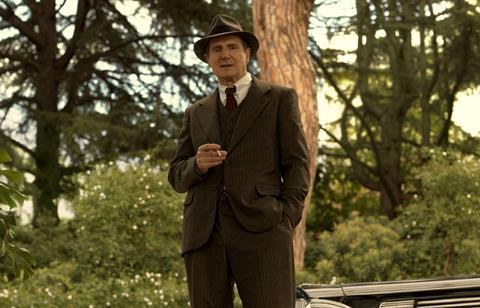Neil Jordan drafts in Liam Neeson for one more turn with Hollywood’s original hard-boiled private eye

Dir: Neil Jordan. Spain/Ireland/France. 2022. 110 mins.
“I’m getting too old for this,” muses Philip Marlowe (Liam Neeson), after a desultory punch-up. His latest screen excursion, Neil Jordan’s Marlowe, suggests that Raymond Chandler’s noble gumshoe may have a point, and that it’s finally time for cinema’s most famous hard-boiled sleuth to retire from active screen service. Based on one of several authorised print revivals of the character – John Banville’s 2014 ’The Black-Eyed Blonde’ – Jordan’s film trots out some familiar thematic and stylistic noir tropes, but beyond its self-reflexive touches and a distinctly Irish flavour, the film sheds little new light on a hero whose last truly revisionist incarnation was Elliott Gould’s modern-day Marlowe in Robert Altman’s 1973 The Long Goodbye.
Not so much old hat as an out-and-out soggy fedora
Short on both charm and Chandlerian complexity, this version coasts on Liam Neeson’s engagingly haggard lead, and some spicy character playing from the likes of Danny Huston, Alan Cumming and Jessica Lange. Marlowe may make an undemanding gala opportunity at San Sebastian and Zurich, but it seems unlikely to chime with wider audiences, as this particular take on retro-noir is not so much old hat as an out-and-out soggy fedora.
The setting is Los Angeles of 1939 – the year that Chandler published his first Marlowe novel ’The Big Sleep’. Stepping into Humphrey Bogart’s revered brogues – although he feels closer to Robert Mitchum’s 1970s Marlowe from Farewell, My Lovely and The Big Sleep - is Neeson, a memorable lead in Jordan’s 1996 Michael Collins. Paying the time-honoured visit to the investigator’s office is the time-honoured mystery dame – one Clare Cavendish (Diane Kruger), a wealthy married woman who wants Marlowe to locate her missing lover, a small-time movie biz figure and full-time lothario named Nico Peterson. It seems that Peterson has been run over and killed outside the Corbata Club, a classy joint with not so classy after-hours attractions.
Marlowe plays cat and mouse in his initial grilling of club manager Floyd Hanson (a quizzically menacing Danny Huston). Unsurprisingly, it turns out that Peterson is not really dead, but conducting some shady business in Mexico – so who and what are behind the fake death? Marlowe looks into the murky pool of corruption, with the aid of his police buddies Joe Green (Ian Hart, with twangy rhythms more befitting a Damon Runyon character) and original Chandler creation Bernie Ohls (Colm Meaney). And he himself is leaned on, with different degrees of poisonous amiability, by Clare’s mother Dorothy Quincannon (Lange), a former silent screen goddess, and mobster Lou Hendricks (Alan Cumming, as a ripely silky southerner).
Drawing on the book by esteemed Irish literary novelist Banville, who has a thriller sideline under the nom de crime ‘Benjamin Black’, Marlowe eccentrically throws in the old country wherever it will fit: some backchat about James Joyce; Mrs Cavendish’s name being Clare, like the county; Marlowe having served with the Royal Irish Rifles; even a gag about “a shamus named Seamus”. Also from Banville is a play on Marlowe’s name, with a character quoting a line from that playwright’s ’Doctor Faustus’: “Why, this is hell…”
With some crunchingly incongruous gags about famous screen MacGuffins, the knowing screenplay by Jordan and William Monahan (Scorsese’s The Departed, George Clooney’s recent The Tender Bar) – doesn’t feel devious enough in its plotting or sufficiently fresh in reimagining either its hero or his LA world. The roles, and eventual fates, of Clare and of Hendricks’ Black chauffeur Cedric (Adewale Akinnuoye-Agbaje) do somewhat bring the mythos in line with 21st-century political consciousness, but only superficially, given how thinly the characters are conceived.
Otherwise, the juice is in some of the turns – notably from Cumming, the dependably creepy Huston, and a regally sly Lange. Neeson, albeit perhaps the least droll-tempered of screen Marlowes, nevertheless mixes rueful world-weariness with monolithic toughness to imposing effect. DoP Xavi Jimenez and designer John Beard put all the appropriate noir touches in place (neon signs duly reflected in pools of rain), but this is not remotely a film that attempts to reimagine Chandlerland from the ground up, and overall Marlowe, shot in Spain and Ireland, evokes a period LA that’s consistently more Mexican-looking than we usually see it in the period classics.
Production companies: Parallel Films, Hills Productions, Davis Films
International sales: Storyboard Media LLC, Elisabeth@storyboard.film
Producers: Alan Moloney, Gary Levinsohn, Mark Fasano, Billy Hines, Philip Kim, Patrick Hibler
Screenplay: William Monahan, Neil Jordan, adapted from the novel ’The Black-Eyed Blonde’ by John Banville
Cinematography: Xavi Jimenez
Production design: John Beard
Editing: Mick Mahon
Music: David Holmes
Main cast: Liam Neeson, Diane Kruger, Jessica Lange, Danny Huston, Alan Cumming, Adewale Akinnuoye-Agbaje























